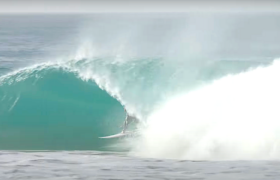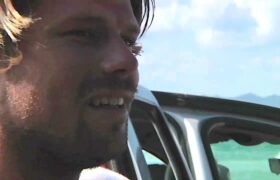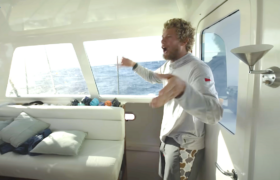Maybe you can guess, maybe you can't. He ain't pretty like Chas but he's good!
Sean Doherty! Did you guess already? Of course you did! There ain’t a surf fan who doesn’t pine for Sean’s spiked analysis of each day’s surf competition.
If you haven’t seen, met, or sighted a photograph of Sean, you must let me describe. He’s a little under the old six-foot measure (more than a little, but let’s be kind! Short people ain’t got the humour us regs do), he has the strong torso of a lifelong surfer (which is surprising because he likes to put away beer), must be very close to forty years old, his crown is relieved of the burden of hair, and as for his surfing ability… yes. He surfs!
And he’s good enough to combo a wave from mouth to ass and enter and exit a tube. On his passport are enough stamps for Hawaii to guarantee his bone fides when it’s over four foot.
Sean is also the author of the definitive biography, MP: the life of Michael Peterson. I feel so bad when I think of this book because when it came out in 2003 I was just launching Stab with my friend Sam McIntosh. We both worked with Sean at emap and while we enjoyed, very much, his company, we felt his style at Tracks was on the wrong side of the surfer-as-patriot line. All those old-school metaphors!
And so when I reviewed the book, which is something like an historical artefact in hindsight, I concentrated not on the skill of the man who pulled it all together but on the character failings of the surfer it covered. And when I saw Sean at some kinda movie premiere shortly afterward he wore his heart on his sleeve and it was bloodied as all hell.
“I was disappointed with what you wrote,” he said.
I acted tough (“Well, fuck, man, that’s what I felt”) but I burned inside. What book had I written? What compelling paragraph had I constructed, even?
Anyway, times change, and over the last couple of years, in particular, I’ve grown to love Sean’s reportage. He’s been in the biz long enough to have good contacts. People trust him. He listens. He watches. He’ll drink at the bar all night if the bro’s are in a fever and so he is included among the pro surfing fraternity, unlike me who constantly frets over his weight and panics if he isn’t asleep by midnight.
In every other sport there’s a handful of writers who define a sport and who write its history, and by history I don’t mean in retrospect, I mean when it’s happening. Sean is surfing’s poet laureate. It’s man of letters.
And so I had many questions to ask. For instance, what is good surf writing?
“The act of surfing itself is quite boring to write about and few people ever do it well,” he says. “My pet hate is the over-romanticising of riding a wave – gliding like a dolphin, soaring like an albatross, that kinda shit – turning surfing into some existential masturbatory act. I like writing that illuminates the characters who do it, because most people I know who surf tend to be unhinged in some way while magnificent in others.”
Sean is the only person that I’m aware of that actually…reports… from surf events. Why does he think this is so?
“No one else seems stupid enough. The great conundrum in writing surf online for chicken feed is that when you’re being paid $150 for a story you fall into the trap of writing $150 worth of pure mediocrity. The problem then comes when the Internet keeps your horseshit contest report alive for eternity with your byline stuck to it in 40-point type. The trick is to write like your story is going to hang around and either help you or haunt you forever. It’s the same principle you should apply to all the menial jobs in your life… lavish the detail on the small things and the big things take care of themselves.”
Does he enjoy this lack of competition?
“I occasionally feel like the last Tasmanian Tiger wandering around the cage in Hobart Zoo,” he says. “It was great for a while when guys like Steve Shearer were writing and there was a bit of a rising tide happening but those days sadly seem long gone.”
Sean’s reporting style is of the purist kind (“I’m the wanker with the notebook,” he says). He isn’t in the media scrum and he eschews the use of cameras.
“The better stories tend to gestate inside bars, in car parks and at parties,” he says. “And I like quirky observational shit. Like, on day one at Snapper this year, the first heat of the first event under the new ASP, and their quest to modernise pro surfing kicked off with Creed’s Arms Wide Open blaring over the PA. It was raining cheese and that was truly a gift from above. You couldn’t make that shit up. But it’s always fun fossicking for a crumb of meaning amongst the general soullessness of pro surfing… and even more fun thrusting meaning upon things that don’t have it. It’s like making a dog talk.”
I say to Sean, I’ve noticed your writing has become more sophisticated over the last year. Have their been external influences? Have you been reading more?
“The only thing I read growing up was the back of an Orchy bottle so I’ve spent my later years trying to backfill the classics,” he says. “I’m pretty voracious these days trying to catch up. It’s amazing how elastic and regenerative the brain can be even after 15 years of sticky green punishment.”
I feel like the best writing comes when you can accurately record, on the page, how you actually feel. So often, I write something, and it doesn’t communicate exactly what I want it to communicate. What about Sean? Is he happy with his results? The cat is honest.
“Not particularly. It all seems a bit disjointed and lost and I don’t really seem to have a voice. I also tend to fall into the habit of plagiarising narratives from whatever book I’m reading at the time and overlaying it on whatever the fuck is going on in the water at the time. It works sometimes… other times not so much. I was reading Mailer’s The Fight during Pipeline last year with Mick and Kelly going for the title and it fitted snugly. Mick and Kelly resolved nicely into Foreman and Ali respectively. One of my favourite characterisations ever came from this book when Mailer described how Foreman dreamed of pummeling Ali and turning him into a “long thin dying clown”. Other times it doesn’t work quite as well. I was reading Morrissey’s autobiography during Snapper this year, but sadly there’s a shortage of misanthropic dandies on tour these days to play the role.”
Is there any ultimate aim in his writing?
“I never really work with a higher purpose, which may explain why I’m stuck writing about surfing,” he says.
What are the keys to becoming a great reporter?
“I suppose you have to highlight the distinction here that you are reporting on surfing and not on American interventionism in the Middle East or a car crashing into an orphanage, so you got to make it fun. Again, it’s just surfing.”
And what advice could first-class surf reporter Sean Doherty give someone wanting to break into the game?
“For the love of God, don’t.”
Read Sean Doherty’s work on coastalwatch.com and at Surfer magazine. Click here!



